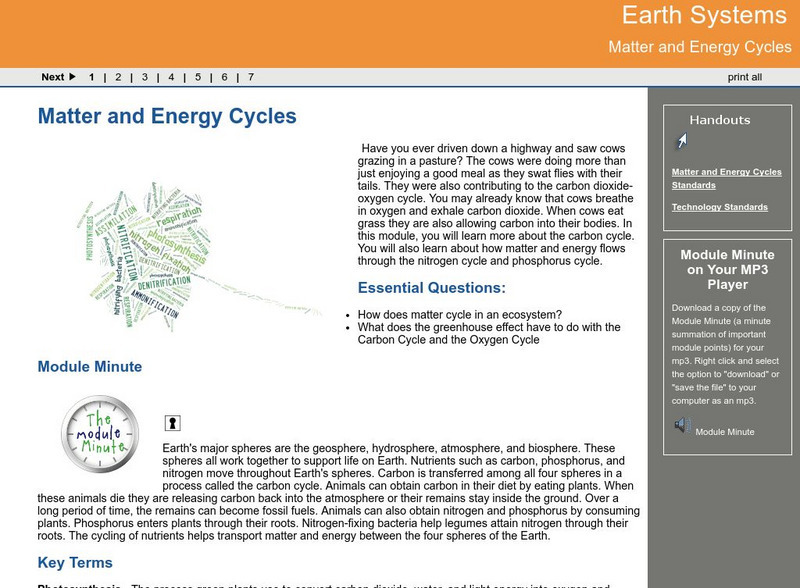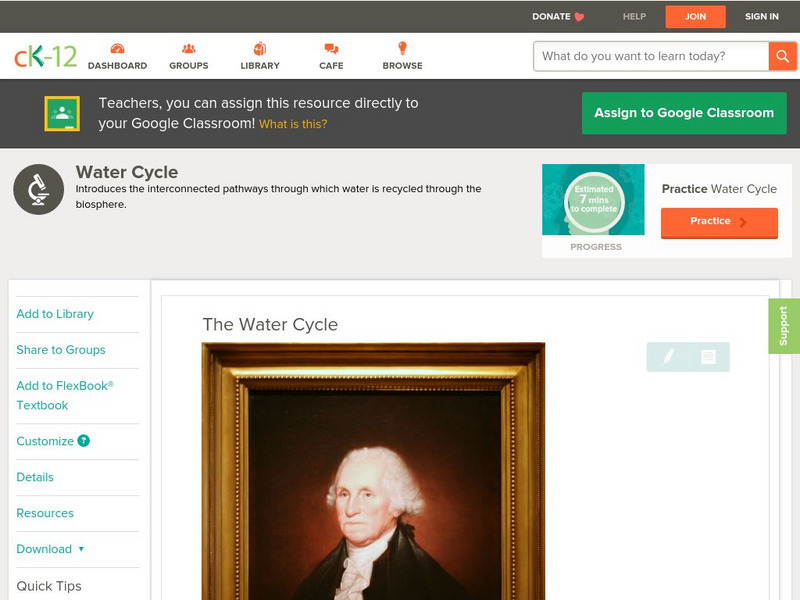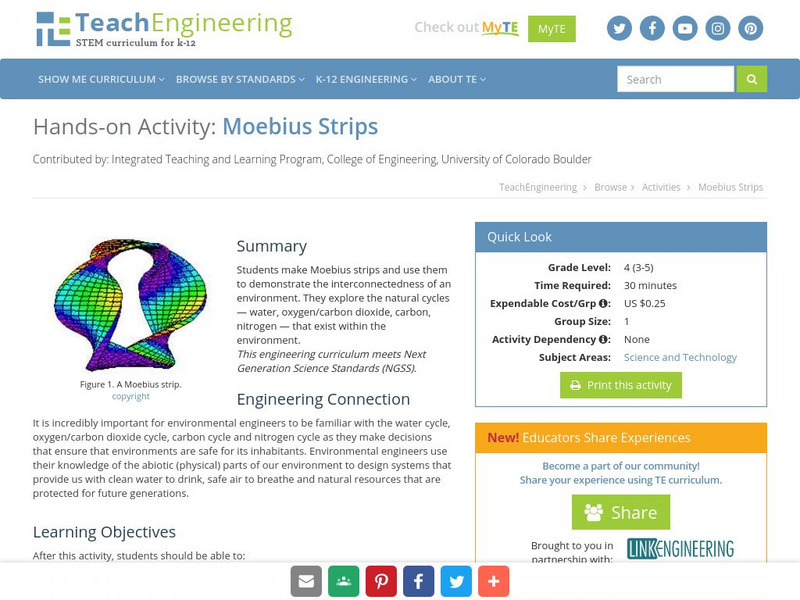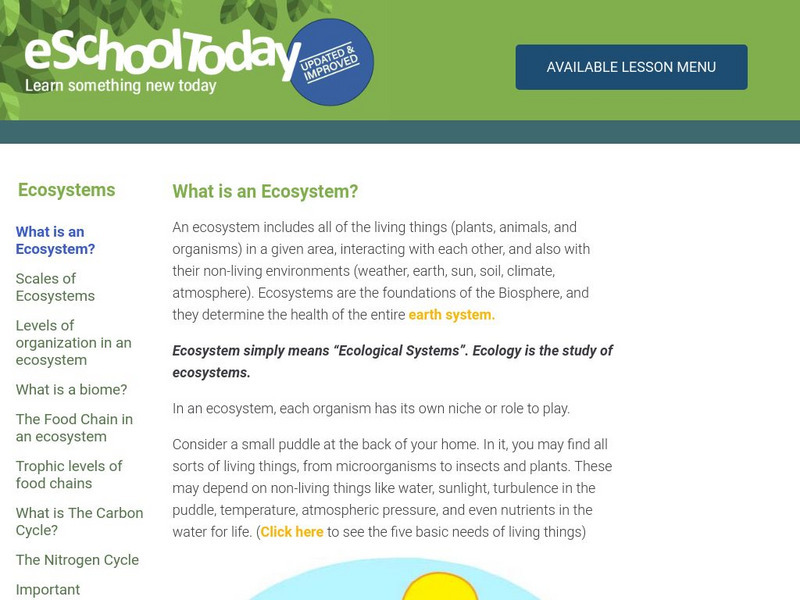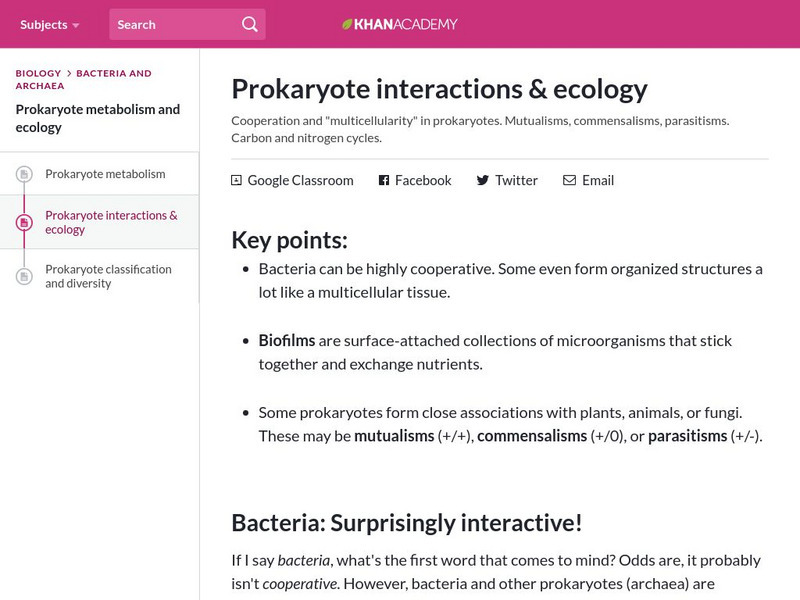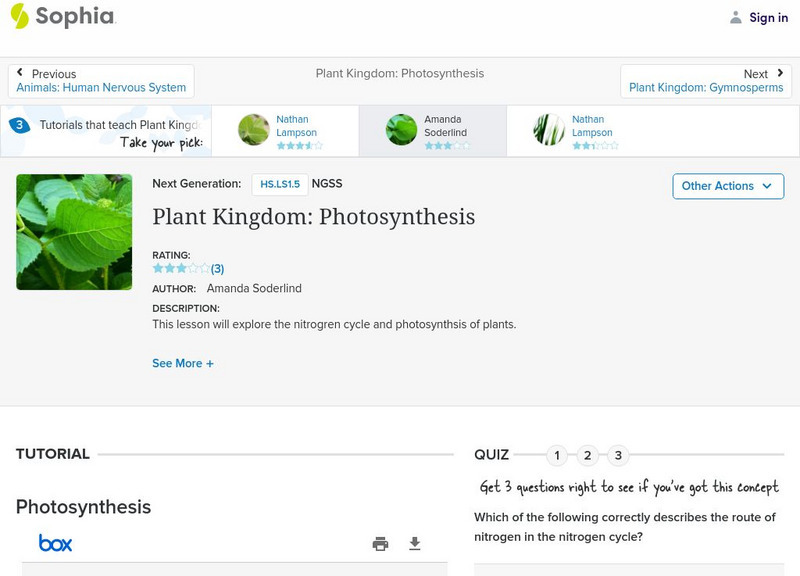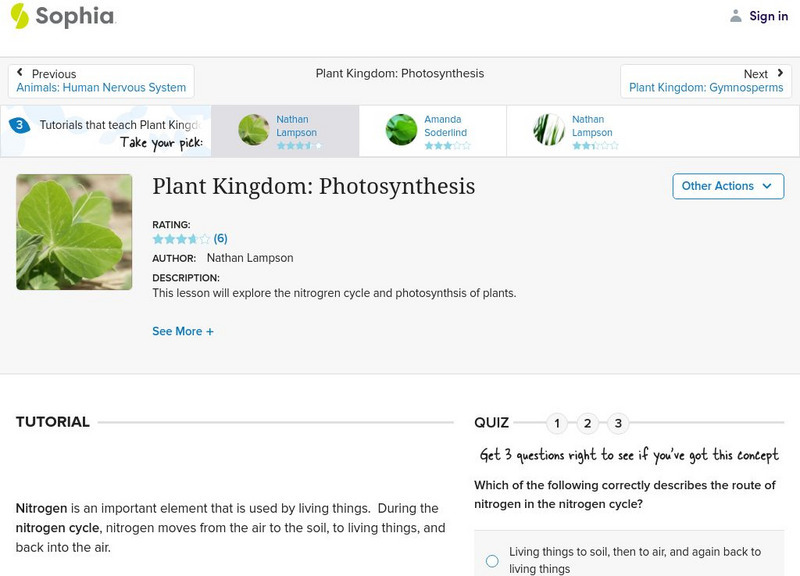BiologyWise
Biology Wise: Information About Nitrifying and Denitrifying Bacteria
Learn about the important role that nitrifying and denitrifying bacteria play in the nitrogen cycle.
Massachusetts Institute of Technology
Mit: Open Course Ware: Courses: Civil Environmental: Ecology I: The Earth System
College-level online course highlighting the fundamentals of ecology. Course topics include coevolution of the biosphere, geosphere, atmosphere, and hydrosphere; photosynthesis and respiration; and the carbon, nitrogen, and water cycles....
Khan Academy
Khan Academy: Biogeochemical Cycles
Test your knowledge of the water cycle, carbon cycle, and nitrogen cycle.
Georgia Department of Education
Ga Virtual Learning: Matter and Energy Cycles
In this incredibly comprehensive interactive tutorial you will learn about the carbon cycle. You will also learn about how matter and energy flows through the nitrogen cycle and phosphorus cycle.
Science Struck
Science Struck: Nitrogen in the Atmosphere
Learn about the properties of nitrogen, how it was first formed, where it is found, and the importance of the nitrogen cycle.
Bio Topics
Bio Topics: Cycles in the Ecosystem
A activity and notes covering cycles in the ecosystem, including the carbon and the nitrogen cycles.
National Earth Science Teachers Association
Windows to the Universe: Ammonia Nh3
Read about the chemical compound ammonia and learn how it is part of the Nitrogen Cycle.
CK-12 Foundation
Ck 12: Life Science: Water Cycle
[Free Registration/Login may be required to access all resource tools.] Water and elements like carbon and nitrogen are constantly being recycled through the environment. This process is called a biogeochemical cycle because it involves...
Sophia Learning
Sophia: Plant Kingdom: Photosynthesis
An introduction to the nitrogen cycle as it relates to plant photosynthesis. Find out how plants obtain the nitrogen they need for life.
University Corporation for Atmospheric Research
Ucar: Nitrogen
Facts about the chemical element, nitrogen found in the Earth's atmosphere.
Thinkport Education
Thinkport: Write Now: Write Now How Can Nitrogen Affect My Business?
Students are asked to conduct online research in order to write an informative article about the development of algae blooms in Maryland's Deep Creek Lake.
TED Talks
Ted: Ted Ed: The Haber Process
Though it has increased food supply worldwide, the Haber process has taken an unforeseen toll on the environment. Daniel D. Dulek delves into the chemistry and consequences of this. [5:19]
Khan Academy
Khan Academy: Biogeochemical Cycles Review
Review information on the cycling of matter throughout the spheres of Earth.
TeachEngineering
Teach Engineering: Go With the Energy Flow
Learners learn about energy and nutrient flow in various biosphere climates and environments. They learn about herbivores, carnivores, omnivores, food chains and food webs, seeing the interdependence between producers, consumers and...
Annenberg Foundation
Annenberg Learner: The Control a Haber Bosch Ammonia Plant
An activity where students try to optimize profits by producing the largest daily output of ammonia by simulating the Haber-Bosch process. Students will use their knowledge of equilibrium reactions and the effects of variables like...
University Corporation for Atmospheric Research
Ucar: Climate Discovery Teacher's Guide: Investigating Climate Present
Lesson plans on the following: Carbon cycle: Carbon Dioxide Sources and Sinks, Nitrogen Cycle: Traveling Nitrogen, Ocean and Atmosphere: Make Convection Currents, Energy Cycle: Albedo
TeachEngineering
Teach Engineering: Moebius Strips
In this activity, students make Moebius strips and use them to demonstrate the interconnectedness of an environment. They will explore the natural cycles (water, oxygen/carbon dioxide, carbon, nitrogen) within the environment.
eSchool Today
E School Today: What Is an Ecosystem?
Learn about all the different levels of ecosystems, from the living things under a rock, up to a rainforest biome. Explains the levels of organization within an ecosystem, the different types of biomes, food chains and trophic levels,...
Khan Academy
Khan Academy: Prokaryote Interactions & Ecology
Learn about cooperation and "multicellularity" in prokaryotes including mutualisms, commensalisms, parasitisms. Also find out the role of prokaryotes in the carbon and nitrogen cycles.
Other
S Cool: Engery Flow and Nutrient Cycle
This website describes trophic levels, transfer of energy between trophic levels, pyramids of ecology, and nutrient cycles within the environment.
Sophia Learning
Sophia: Plant Kingdom: Photosynthesis: Lesson 2
This lesson will explore the nitrogren cycle and photosynthsis of plants. It is 2 of 3 in the series titled "Plant Kingdom: Photosynthesis."
Sophia Learning
Sophia: Plant Kingdom: Photosynthesis: Lesson 1
This lesson will explore the nitrogren cycle and photosynthsis of plants. It is 1 of 3 in the series titled "Plant Kingdom: Photosynthesis."
Other
University of Delaware: Chemosynthesis.
An explanation of how in the deep sea, where the sun's rays never reach, organisms make food from chemicals, a process called chemosynthesis.
NOAA
Noaa: Estuaries 101 Curriculum: Nutrients in an Estuary
An overload of nutrients, called eutrophication (Greek for "good-nutrition"), can be harmful to estuaries. This phenomenon is also referred to as "over-enrichment," or "nutrient pollution". Students will investigate the range of...



